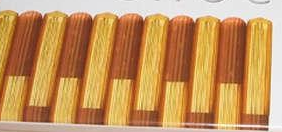In cancellation proceedings the German Federal Patent Court denied registrability to a 3-D-mark depicting a chocolate stick for chocolate products largely based on evidence it had collected on its own motion (Decision of 22 April 2016 on Case 25 W(pat) 8/09).
The International Registration (“IR”) depicted below
was registered in December 2005 in Germany. In 2006 it was attacked with a request for withdrawal of protection in Germany based on
- the lacking clarity of the depiction of the IR
- and the lacking distinctiveness and descriptive nature of the attacked IR.
In 2011 the Federal Patent Court (“FPC”) withdrew protection of the mark in Germany arguing that the depiction of the mark was not sufficiently clear and precise. This decision was lifted by the Federal Supreme Court in 2013 applying more generous standards with respect to the clarity of the trademark depiction. The case was referred back to the FPC for deciding on the lacking distinctiveness / descriptive nature of the attacked three-dimensional IR for the goods chocolate, chocolate products and cocoa.
Prior to the hearing, the FPC referred the parties to several chocolate products sold in Germany, in particular the products Amicelli, Mikado and Chocolat d’or shown below:
It also made enquiries to the producers of these products since when these products were offered in Germany.
The trademark owner disagreed with this and argued that the FPC could not investigate on its own motion. According to the trademark owner, the adversarial nature of cancellation proceedings restricts the principle of official investigation. This was according to the trademark owner also supported by the fact that the burden of proof for the lacking distinctiveness or the descriptive nature was with the applicant.
The FPC held that the principle of official investigation was not restricted in cancellation proceedings based on absolute grounds for refusal. Cancellation proceedings are inter partes proceedings, however, they are motivated by the public interest to keep the register free from unlawfully registered marks. Also the fact that the burden of proof for lacking distinctiveness / descriptive character is with the applicant does not lead to restrictions of the principle of official investigation. In particular, it does not mean that proof may exclusively be brought into the proceedings by the applicant. It only means that the applicant has to bear the legal consequences of the lacking proof.
The FPC cancelled protection of the IR for chocolate and chocolate products in Germany. As the chocolate products shown above had been on the marketplace in Germany before registration of the attacked IR, the FPC held that it lacks distinctiveness for chocolate and chocolate products. It reiterated that for three-dimensional marks consisting of the shape of the product itself, a function of the mark to identify its origin could generally only be accepted if the mark deviated substantially from the norms or customs of the sector involved. With regard to the attacked IR it held that this was not the case for chocolate and chocolate products. Even though no identical product was offered before by third parties, the stick shape of the IR was known from chocolate products offered in Germany before its registration. Also the crumbs on the top were known from pralines or chocolate as was the irregular, curved shape of the sticks. When considering earlier products offered in Germany, the FPC also took into account that the applicant itself had offered an almost identical product for five months in a well-known discounter in part of Germany before registration of the attacked IR. According to the FPC it could not be required that this product had gained a certain market share or was used for a longer period before registration of the attacked IR.
The FPC refused to withdraw protection for the IR with regard to cocoa. Cocoa was also offered in several shapes, such as balls, for preparing coca drinks, but not in shapes similar to the IR.
The FPC allowed the further appeal to the Federal Supreme Court, because of legal issues of fundamental significance. In this respect it is interesting to note that the FPC’s approach to investigation of facts of the court’s own motion is directly contrary to the recently amended procedural principles in EUTM (formerly: CTM) law. Following the EU Trademark Law Reform, Article 76(1) EUTM Regulation now expressly states that in absolute grounds cancellation actions, the Office cannot investigate the facts of its own motion.
_____________________________
To make sure you do not miss out on regular updates from the Kluwer Trademark Blog, please subscribe here.






